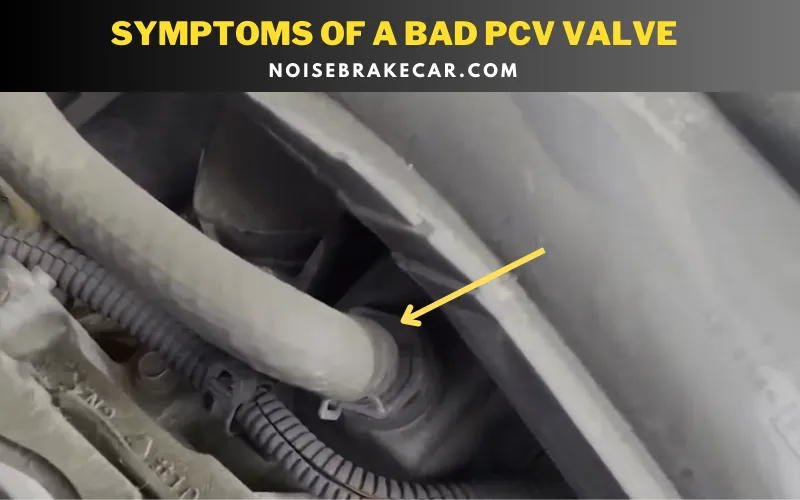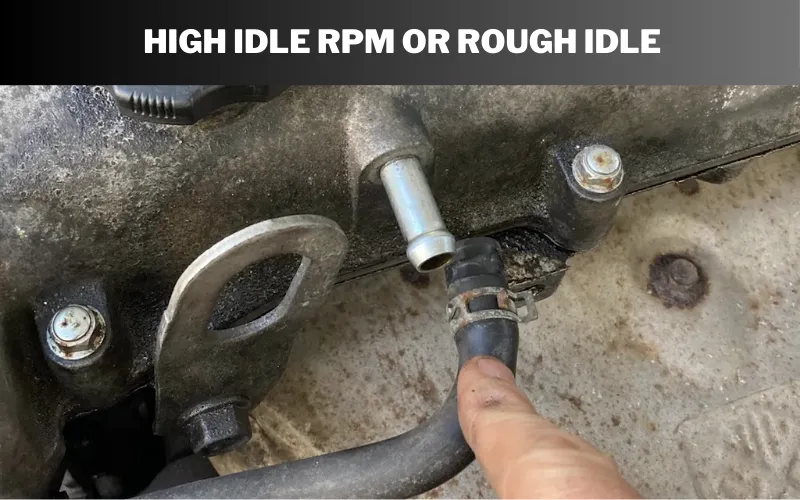In this article we will talking about the PCV valve and symptoms of PCV and how to tell if it’s gone bad, we’re here to break down what to look out for if you think it’s going bad but first let’s understand what a PCV valve is the.
What is PCV Valve?
PCV valve short for positive crankcase ventilation valve works by expelling harmful exhaust gases from the crank case and redirecting them back into the intake manifold where they get burned up in the combustion chamber instead of being released into the environment through the exhaust system the PCV valve.
ensures that gases flow out of the crank case but not back in So as the engine runs it generates a mix of pressurized oil fumes within the crank case and cylinder head primarily due to heat and blow by gases those blow by gases are hot combustion gases that escape the combustion chamber so to prevent pressure build up in the sealed crank case it needs to be vented out.
However, releasing them directly into the atmosphere isn’t advisable as it would be environmentally harmful to prevent such issues most car manufacturers install a PCV valve to control the flow its main role is to reduce harmful emissions by opening wider to allow more ventilation from the crank case this increased air flow is necessary due to the higher speed and faster accumulation of crank case pressure.

It also ensures that the gases from the crank case are routed back into the combust combustion process where they’re burned off most cars have simple PCV valves and it rarely malfunctions however,
When it goes bad it has confusing symptoms that can lead you to look in the wrong areas and can result in unnecessary repairs and expenses locating it is easy just follow the hose running between the engine intake manifold and the cylinder cover and near the engine side, you’ll spot a small piece of plastic that’s your PC CV valve.
While most cars have straightforward setup some have a more intricate crank case ventilation system that features a cone-shaped separator at its base which effectively filters oil droplets from the fumes heading toward the engine also other car manufacturers put the PCV valve and other components directly into the valve cover now let’s see what will happen if your PCV valve goes bad by looking at the possible.
Symptoms of Bad PCV Valve
- High Idle Rpm or Rough Idle
- Engine Misfiring
- Lean or Rich Mixture
- Check Engine Light
- Engine Stalling
- Poor Oil Economy
- Smoke From the Exhaust Pipe
- Contaminated Filter
- Unusual Engine Sounds
1) High Idle Rpm or Rough Idle
rough idle the PCV valve control the air flow between the intake manifold and the crank case when it is damaged. it can exhibit symptoms that are the same of an intake leak like high idle RPM or other irregular idle Behavior like engine stalling also when a PCV valve becomes stuck in the wide-open position it can function as an air leak that allows unmetered air into the engine’s intake similarly,
if one of the hoses is connecting the PCV valve and the intake manifold is damaged or broken. The result is one of two things that cause engine idling problems, such as stalling or idling at high normal speeds.
2) Engine Misfiring
misfiring can also indicate a faulty PCV valve typically this arises from an imbalanced fuel air mixture either too rich or too lean. Which leads to idling issues or stalling while driving an excessive amount of fuel or air can cause the engine to misfire and decelerate again a faulty PCV valve shares symptoms with an intake. Leak both of which disrupt the air fuel mixture when a broken hose permit.
Outside air in the intake mixture may turn to oil, creating uncertainty or leading to the third speed figure in case of failure of the PVC valve. It leads to improper fuel mixing and you may experience rough acceleration both at low and high speeds similarly if a PCV valve remains stuck open or if one of its hoses is broken it can disrupt the fuel mixture and results in rough acceleration using a scan tool is the most effective method to diagnose the root cause of this issue.

3) Lean or Rich Mixture
lean or Rich mixture the PCV valve regulates the air flow between the crankcase and the intake manifold so when it became bad it can result in an engine running rich or lean due to an improper fuel air mixture if the engine runs rich you may notice symptoms such as gray or white smoke from the exhaust pipe.
Often accompanied by a strong smell of gasoline once more turn to your scan tool to check live data and monitor air fuel ratios so you can pinpoint the issue accurately additionally when you press down on the accelerator the engine begins drawing in a substantial amount of air through its intake.
4) Check Engine Light
On the illumination of the check engine light is often one of the first signs of a faulty PCV valve when this comes on it means that an error code has been stored in the PCM use an OBD2 scanner to retrieve the trouble codes and to diagnose the issue this is important if your car has an electronically controlled version of the PCV valve.
However, even in the absence of electronic control a malfunctioning PCV valve can disrupt the air fuel mixture which causes the check engine light to illuminate.
5) Engine Stalling
Faulty PCV valve can lead to the Piston remaining open which allows an abnormal amount of air into the combustion cylinder this imbalance creates a leaner air Fel fuel mixture as the cylinder contains more air than fuel consequently the engine May stall or run poorly at idle.
6) Poor Oil Economy
Malfunctioning PCV valve can result in an oil leak and poor oil economy since it can cause excessive pressure to build up in the crank case under such circumstances the pressure May Force oil out of the gaskets as there’s no other Outlet to relieve the pressure an oil leak can lead to the car burning oil and oil seeping from underneath the vehicle also heightened pressure can rupture seals and gaskets which also results in irreversible oil leaks.
So, if the PCV valve is stuck wide open the engine May draw in oil fumes even when it shouldn’t such as during acceleration or idling ultimately any oil that gets burned off during combustion must find a way out typically through the exhaust pipe of your car.
7) Smoke From the Exhaust Pipe
when the hoses or valve fail your crank case can force engine oil to burn in the combustion chamber and the air fuel mixture may become too lean or too rich which can result in significant amounts of blue or black smoke from the tailpipe.
So, if You observe large amounts of smoke, it’s likely that your PCV valve is faulty several diagnostic trouble codes may appear here if you have a bad PCV valve such as p052e, P017, P0300 and p053a while checking these codes can be a good starting point it still doesn’t guarantee that the PCV valve is the only reason of it as always conduct a thorough troubleshooting before replacing any parts to ensure an accurate diagnosis.
8) Contaminated Filter
filter as the PCV valve starts to fail the vehicle’s breather element or filter can become contaminated with oils and hydrocarbons this is due to the increased pressure in the crank case which causes water vapor to flow through the Breather element.
So, when water enters the Breather element it can mix with gas and results in deposits and ultimately leading to poor fuel economy for you to inspect the Breather element the most effective method is to physically examine the filter for any debris or buildup at the same time monitor.
Your car’s fuel consumption because it can also provide valuable insights since an unexpected increase in fuel consumption without any apparent cause is one sign of a bad PCV valve.
9) Unusual Engine Sounds
engine noises a faulty PCV valve can result in the engine emitting unusual noises such as Grunts and hisses from under the hood these typically occur because of air leakage through the valve or holes in the valve hose any random noises coming from the engine are often a sign of an underlying issue.
So always look for unexpected engine sounds and have it inspected how much does it cost to replace a PCV valve the cost of replacing the PCV valve depends on your car model and the valve’s location for most engines the component typically costs less than $50 and with easy access replacing it is easy.
However, in some cars the PCV valve may be tucked away deep within the engine’s intake which makes the replacement more challenging there you have it the 10 symptoms of a faulty PCV valve so if you suspect that your PCV valve is already malfunctioning and you’ve noticed some of these signs now might be the right time to have it checked and replaced.